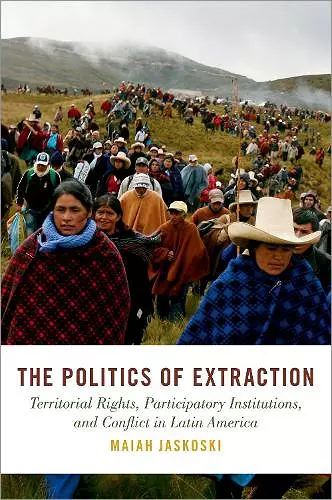The Politics of Extraction
Territorial Rights, Participatory Institutions, and Conflict in Latin America
Format:Hardback
Publisher:Oxford University Press Inc
Published:14th Oct '22
Should be back in stock very soon

Mining and hydrocarbon production in Latin America is high-stakes for extractive firms, communities in resource-rich zones, and states. Amid global commodity price increases and liberal economic policies, the sectors have expanded dramatically in recent decades. This surge has made private investors and governments in the region ever more committed to extraction. It also has increased alarm within local communities, which have organized around the environmental, cultural, and social impacts of mining and hydrocarbons. Moreover, activists have mobilized to demand material benefits, in the forms of royalty distributions and direct company investment in local services and infrastructure. These conflicts take the form of legal battles, large-scale protests, and standoffs that pit communities against companies and the state, and consequently have suspended production, destabilized politics, and expended state security resources. In The Politics of Extraction, Maiah Jaskoski looks at how mobilized communities in Latin America's hydrocarbon and mining regions use participatory institutions to challenge extraction. In some cases, communities act within formal participatory spaces, while in others, they organize "around" or "in reaction to" these institutions, using participatory procedures as focal points in the escalation of conflict. Based on analysis of thirty major extractive conflicts in Bolivia, Colombia, and Peru in the 2000s and 2010s, Jaskoski examines community uses of public hearings built into environmental licensing, state-led prior consultation with native communities affected by large-scale development, and local popular consultations or referenda. She finds that communities select their strategies in response to the specific participatory challenges they confront: the trials of initiating participatory processes, gaining inclusion in participatory events, and, for communities with such access, expressing views about extraction at the participatory stage. Surprisingly, the communities least likely to channel their concerns through state institutions are the most unified and have the strongest guarantee of participation. Including a wealth of data and complex stories, Jaskoski provides the first systematic study of how participatory institutions either channel or exacerbate conflict over extraction.
This book is an outstanding analysis of one of the most urgent issues in Latin American politics: the impact of new participatory institutions on the conflict between extractive companies and nearby communities...This book is an outstanding analysis of one of the most urgent issues in Latin American politics: the impact of new participatory institutions on the conflict between extractive companies and nearby communities. * Choice *
Can participatory institutions coexist with extractive development? What is the role of participatory institutions such as consulta previa, consulta popular, and environmental impact assessments when extractive conflicts arise between local communities and companies? In a comparative study of thirty major conflicts over oil and mining extraction in Bolivia, Peru, and Colombia, Jaskoski masterfully dissects the way participatory institutions work (or not) in different societal and state contexts. This book is a major contribution to the literatures on participatory institutions and extractivism. * Tulia G. Falleti, Class of 1965 Professor of Political Science and Director of the Center for Latin American and Latinx Studies, University of Pennsylvania *
Jaskoski pulls off two difficult tasks simultaneously: she offers a remarkable array of 30 detailed case studies of community responses to extractive projects and an innovative framework that makes sense of their diversity. This is an unmissable tour de force that illuminates both the civil society movements and the institutions they work through and around, important for scholars of Latin America and beyond. * Kathryn Hochstetler, Professor of International Development, LSE *
At last, a book that brings into sharp focus the full range of difficult issues that afflict participatory institutions ostensibly designed to bring justice to communities in conflict over large-scale extractive development projects. The precision, clarity, and richness of the analysis, combined with the comprehensive nature of the work, make it a 'one-stop shop' for understanding the promise, perils, and disappointments of these innovative institutions for communities. * Eduardo Silva, Friezo Foundation Chair in Political Science, Tulane University *
For well over a decade, Maiah Jaskoski has been a keen observer of conflicts surrounding extractive industries in the Andean countries. This book combines her sharp eye for detail with a comparative analysis of thirty of the region's most iconic conflicts over resource extraction. She uses this empirical depth to engage with scholarship on participatory institutions and conflict dynamics and delivers novel and important insights for literatures on institutional change, contentious politics, and extractive industry governance. A substantial contribution. * Anthony Bebbington, International Director, Natural Resources and Climate Change, Ford Foundation *
ISBN: 9780197568927
Dimensions: 238mm x 161mm x 23mm
Weight: 590g
296 pages